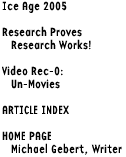


TAKE THE RECENT NATIONAL ELECTIONS. Both sides spent enormous fortunes on “internals,” the private, closely-guarded polls which not only track how well the candidate is doing but how well he might do if he said X, supported Y, ran an ad about Z. Basically no move is made without a poll supporting it—as a tactic, regardless of its policy merits.
When both sides come so close to absolute foreknowledge of what every action will produce, however, it becomes next to impossible to justify a move that might alienate someone you already have on the chance it will win over someone you don’t. The result is that both parties hug their bases like swimmers hugging shoreline; Bush would have no more said something to scare Focus on the Family than Kerry would have said something that might have kept a single unionized teacher home. The candidates start the race almost dead even and spend the entire race hunting for the tiny thing that might dislodge a single percentage point their way, without disturbing the all-important base.
The result is that the 60-40 landslide, once a normal feature of elections, has basically been focus-grouped out of existence (the last one happened in 1984). Well, better to lose by 2% than 20%, right? But it’s blowout losses, like Barry Goldwater’s in 1964, that produce the sort of soulsearching and innovation that reinvigorate parties. A party that won 49% will keep looking for the charismatic politician who can gain it that one extra point. A party that was slaughtered at the polls will reinvent itself wholesale—and in its desperation it will generate lots of risky new ideas, one of which might be the seed for an entire new movement.
BUT AT LEAST IN A PRESIDENTIAL RACE, SOMEONE ALWAYS WINS. There are areas where perfect knowledge of what your base wants may help you maintain a dominant position within the system—but blind you to the fact that you’re sending the whole system itself down the tubes. Take FM radio. Out of their fear that a single less-than-exciting moment might cause the listener to hit the Scan button, the Clear Channels of the world ruthlessly got rid of every excess of 70s FM radio—the pretentious DJs, the playing of entire albums, any cut that hadn’t been focus-grouped to become a guaranteed hit.
The result is that commercial radio is now perfectly adapted to the tastes of its existing listeners—and basically unbearable to anyone who isn’t already in that group. Which is fine, as long as nobody invents, say, a portable music player with a hard drive, or a satellite radio system with 150 channels, or any other device that will do to FM what FM did to AM.
THE PROBLEM IN BOTH THESE CASES, OF COURSE, ISN'T THAT PEOPLE HAVE INFORMATION —it’s the way information is being used, to prevent innovation (indeed, to hunt it down and kill it). I would go so far as to say that research has a built-in bias toward the status quo—watch what happens when something like logo concepts are put in front of a focus group. The group will inevitably drift toward the most familiar design, the one that looks most like existing bank/soft drink/whatever logos. They’re not picking the one that is most likely to build a great brand—they’re just getting an A in Match the Logo to the Category.
Old school direct guys have long had a way of forcing innovation back into the process, by constantly testing small cells of new creative or offers to see if something from left field can knock off the existing champ. (It happens—a few years back I did a piece that dethroned the control at MCI.) That’s a start, but advertising, like music or politics, is also a part of the broader culture—and there are some cultural phenomena (Beatlemania, Ross Perot suddenly making deficit hawkishness a viable position) that just can’t be tested on any sample smaller than the whole culture. In those cases, for something new to break in requires someone with the guts to look at the numbers—and then say, “What the hell, let’s do it anyway.”